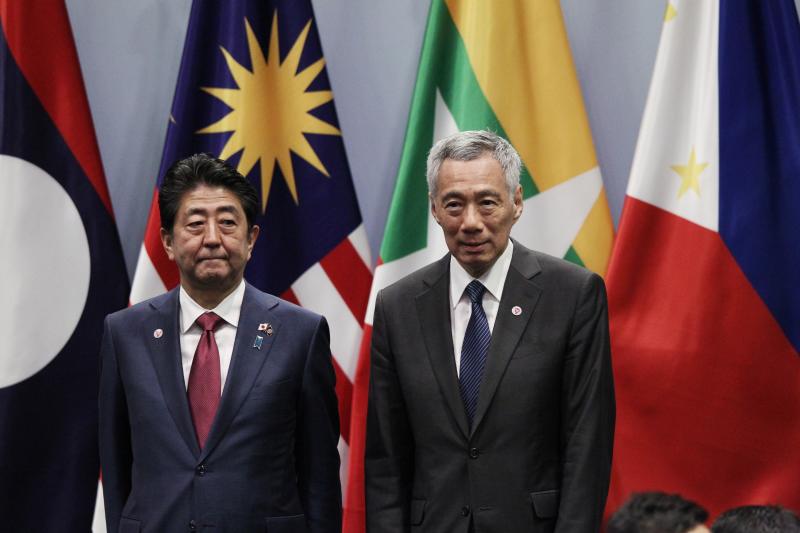Principles of Japan's Indo-Pacific strategy align with Singapore, Asean priorities: PM Lee
Sign up now: Get ST's newsletters delivered to your inbox

PM Lee Hsien Loong thanked Japan for its offer to host a high-level meeting of the network in 2019 to help cities in the network effectively implement their action plans.
ST PHOTO: GAVIN FOO
SINGAPORE - The core principles of Japan's Free and Open Indo-Pacific Strategy, which seeks to promote the rule of law at sea and build high-quality infrastructure in locations across the Indian and Pacific oceans, align well with Singapore's and Asean's priorities, said Prime Minister Lee Hsien Loong on Wednesday (Nov 14).
At the Asean-Japan Summit in Suntec Singapore International Convention and Exhibition Centre, Mr Lee said Singapore appreciated Japan's efforts to articulate its strategy to Asean members, as well as its receptiveness to feedback.
He noted that Asean was guided by three main considerations on the matter: Whether the strategy supported Asean unity and centrality; whether it facilitated trade, investment and connectivity in the region; and if it espoused a rules-based world order anchored on international law.
"The end result must be an open and inclusive regional architecture, where Asean member states are not forced to take sides," said Mr Lee.
"In this context, the core principles of Japan's Free and Open Indo-Pacific Strategy align well with Singapore and with Asean's priorities."
Mr Lee also said Asean was grateful for the continued support of Japan - a world leader in innovation and technology - in the Asean Smart Cities Network.
This network, an initiative spearheaded by Singapore as this year's Asean chair, allows cities to cooperate, share experiences and work with external partners as well as the private sector on smart city initiatives.
Mr Lee thanked Japan for its offer to host a high-level meeting of the network in 2019 to help cities in the network effectively implement their action plans.
He also said Asean and Japan are committed to expanding economic relations through strengthening the Asean-Japan Comprehensive Economic Partnership, and both parties are collaborating closely in connectivity and cyber-security cooperation as well.
In his opening remarks at the Asean-Japan Summit, Japan's Prime Minister Shinzo Abe noted that his country had "outperformed" its commitment of providing two trillion yen in five years, through the higher level of assistance it has given Asean, while honouring its unity and centrality.
Mr Abe had committed this sum in 2013, in overseas development assistance loans to the region, to mark 40 years of Japan-Asean ties.
Projects funded included one to increase the transport capacity of a national highway in Cambodia, and another involving a new mass rapid transit line in Thailand.


